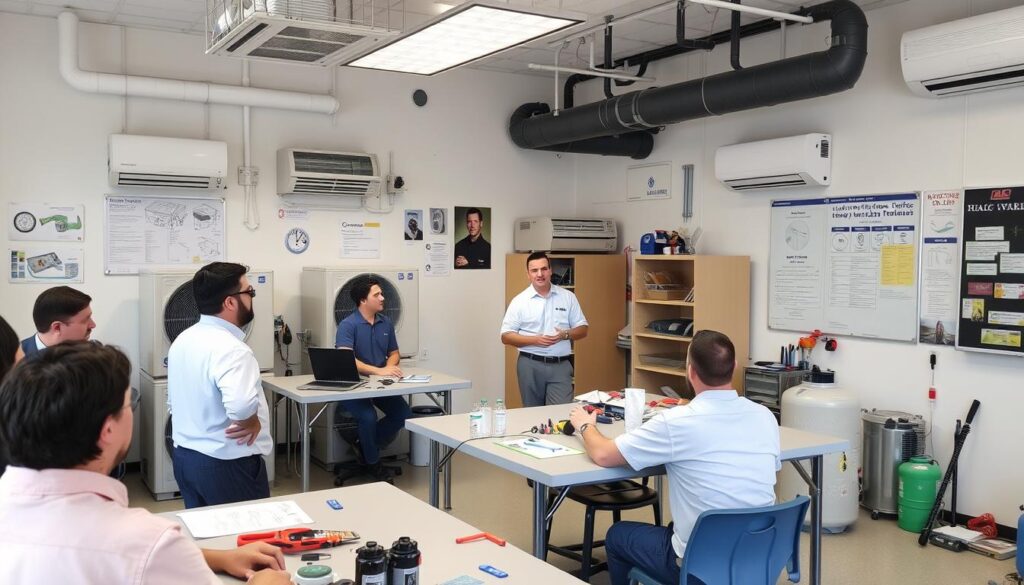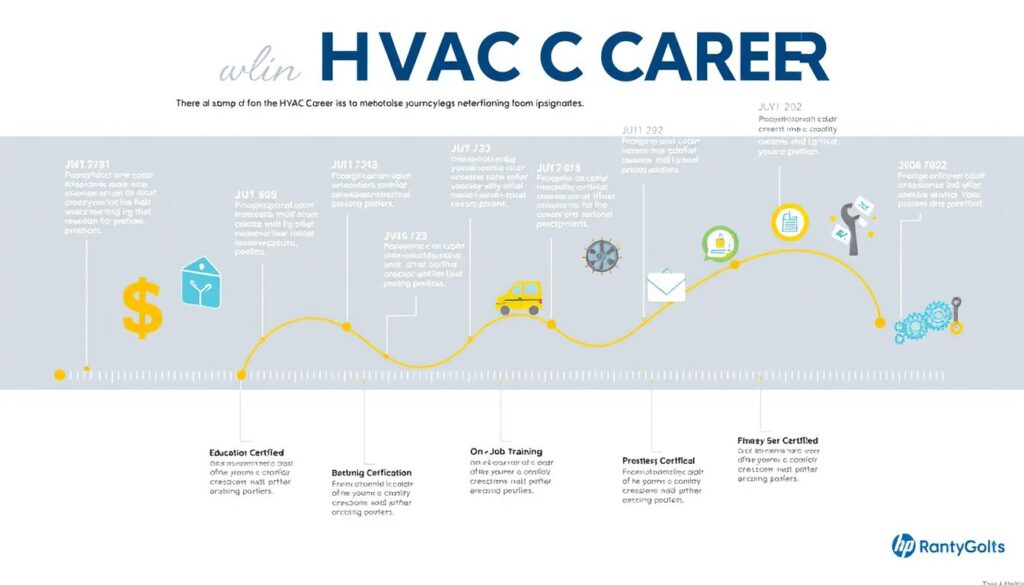Affiliate Disclosure
HVAC Guide Guys is a participant in the Amazon Services LLC Associates Program, an affiliate advertising program designed to provide a means for sites to earn advertising fees by advertising and linking to Amazon.
Do I Need a GED for HVAC? HVAC is a booming field, with over 415,800 professionals in the U.S. The job for HVAC techs is expected to grow by 15% by 2026. In Georgia, there are 11,520 HVAC workers, with an average salary of $53,500.

Thinking about a career in HVAC? You might wonder about the education needed. A high school diploma or GED is usually the starting point. But, there are many ways to become a skilled HVAC tech. This guide will cover the career needs, training, and certifications for success in HVAC.
Key Takeaways
- HVAC is a growing industry with a 15% job outlook growth rate through 2026.
- A high school diploma or GED is the typical minimum educational requirement for HVAC programs.
- HVAC training programs can range from 6 months to 2 years, with apprenticeships lasting 3-5 years.
- Certifications like NATE and EPA Section 608 can enhance job prospects and demonstrate specialized skills.
- HVAC technicians can pursue career advancement through continuing education and licensing requirements.
Table of Contents
Understanding Basic HVAC Career Requirements
Starting a career in HVAC involves meeting some key requirements. While these needs can change, there are basic guidelines to follow. Aspiring HVAC technicians should know these.
Minimum Age and Educational Prerequisites
Most HVAC programs and jobs need a high school diploma or GED. This ensures candidates have a strong base in math, science, and technical skills. These are key for understanding HVAC systems and parts.
General Skills and Aptitudes Needed
- Strong problem-solving and critical-thinking abilities
- Proficiency in reading and interpreting technical diagrams, blueprints, and manuals
- Familiarity with various hand and power tools used in the HVAC industry
- Understanding of electrical circuits and their functions
- Excellent customer service skills for interacting with clients
Physical Requirements for HVAC Work
HVAC technicians work in tight spaces, on ladders, and in different weather. They need good physical strength, stamina, and can lift heavy equipment. They must also be comfortable working with their hands and in small spaces.
These are the basic qualifications for starting an HVAC career. Knowing these helps prepare for the rewarding and growing field of HVAC.
The HVAC industry is expected to grow by 15% by 2026, says the Bureau of Labor Statistics. This growth, along with the increasing need for HVAC services, makes it a great career choice. It offers stability and rewards for those looking for a fulfilling job.
Do I Need a GED for HVAC
Starting a career in HVAC (Heating, Ventilation, and Air Conditioning) has different educational needs. Most HVAC programs and apprenticeships require a high school diploma or GED. But, the exact needs can change based on where you live.
In Georgia, for example, you need a high school diploma or GED to get a Conditioned Air Contractor license. This license is key for working as an HVAC technician. Yet, some entry-level HVAC workers might not need a license. They just need to work under a licensed professional.
The HVAC field values education and hands-on training a lot. This ensures technicians have the skills and knowledge to do well. Many HVAC programs and apprenticeships cover important topics like refrigeration and electrical systems.
Whether you have a high school diploma or a GED, it’s crucial to meet the educational needs of your chosen HVAC program or apprenticeship. With the right training and certifications, you can open up many career doors in HVAC.
Make sure to check the HVAC education and training needs in your area. Investing in your HVAC education can lead to a fulfilling career in this expanding field.
Explore Our HVAC Shop
Looking for top-rated HVAC tools, parts, and accessories? Visit our shop and find the perfect solution for your needs.
Visit the ShopAlternative Paths to HVAC Certification
If you want to be an HVAC technician, you have many options. You can choose from trade schools, apprenticeships, or on-the-job training. Each path fits different learning styles and goals.
Trade School Programs
Trade school for HVAC lasts from six months to two years. These programs teach you about installing, maintaining, and fixing HVAC systems. You’ll get hands-on experience, which is key for success.
Apprenticeship Opportunities
Apprenticeships for HVAC last 3 to 5 years. They mix on-the-job training with classroom learning. You’ll work with experienced technicians, learning the trade from the start.
On-the-Job Training Options
Some jobs offer on-the-job training for HVAC techs. You learn while you work and might get your certifications paid for by your employer.
| Training Program | Duration | Cost | Key Advantages |
|---|---|---|---|
| Trade School Programs | 6 months to 2 years | $1,144 to $44,978 | Comprehensive curriculum, hands-on training |
| Apprenticeship Programs | 3 to 5 years | Varies | Earn while you learn, gain practical experience |
| On-the-Job Training | Varies | Employer-sponsored | Earn a paycheck, employer covers certification costs |
Getting HVAC certification is key to starting your HVAC career. With the right training, you’ll be ready for the HVAC industry’s challenges. You’ll also meet the growing need for skilled technicians.
Essential HVAC Training Programs
If you’re thinking about a career in HVAC, you’ll find many training options. These programs teach about heating, cooling, and air systems. They also cover electrical parts and how to fix problems.
These courses are found at technical schools, community colleges, and trade schools. In places like Georgia, you need a special course to get licensed. This course makes sure you know how to install safe and efficient systems.
The Bureau of Labor Statistics says the HVAC field needs more workers. It’s expected to need about 19,000 more technicians in the U.S. over the next ten years. This is a great time to start an HVAC training program.
HVAC programs mix basic and specific courses. For example, The Refrigeration School (RSI) has a class on refrigeration basics. It covers refrigeration cycles, refrigerant properties, and safety.
Other topics include electrical basics, comfort systems for homes and businesses, and advanced troubleshooting. Classes in physics and chemistry also help build a strong foundation for HVAC education and success.
Many employers want technicians with experience. Getting an HVAC certification can help you stand out. It lets you start working as an HVAC technician in about six months, much faster than getting a bachelor’s degree.

“An HVAC technician can start earning six months after starting studies, four times quicker than someone pursuing a bachelor’s degree.”
Explore Our HVAC Shop
Looking for top-rated HVAC tools, parts, and accessories? Visit our shop and find the perfect solution for your needs.
Visit the ShopRequired Licenses and Certifications
In the United States, HVAC professionals need several licenses and certifications to work legally. The EPA Section 608 Certification is key for those who handle refrigerants. It makes sure technicians safely work with these materials.
State-specific HVAC requirements also matter a lot. For example, Alabama needs HVAC contractors to have an apprenticeship or 3,000 hours of experience. Arizona requires four years of experience or a mix of two years and training.
Additional Industry Certifications
While EPA and state licenses are important, HVAC pros can get more certifications too. The NATE (North American Technician Excellence) certification shows a technician’s advanced skills in HVAC.
| Certification | Purpose |
|---|---|
| EPA Section 608 | Mandatory for handling refrigerants |
| State-Specific HVAC Requirements | Varies by state, often including experience, education, and exams |
| NATE Certification | Demonstrates advanced HVAC knowledge and skills |
Getting the right HVAC certification and meeting state needs helps HVAC pros start their careers. They can then offer top-notch services to their clients.
Career Growth and Advancement Opportunities
The HVAC industry is full of chances for career growth and advancement. As an HVAC technician, you can grow your skills and take on new roles. You can become a supervisor or specialize in certain HVAC systems.
Getting more education and certifications is key to your career growth. Learning about energy efficiency and new technologies can lead to better jobs and higher pay.
- Pursue supervisory or management positions, overseeing teams of HVAC technicians
- Specialize in specific HVAC systems, such as commercial refrigeration or geothermal systems
- Consider starting your own HVAC contracting business, leveraging your technical skills and industry knowledge
Staying updated is crucial in the HVAC field. Attend training, workshops, and conferences to learn about new trends and best practices. Getting certifications from groups like NATE or HVAC Excellence can boost your career.
| Certification | Focus Area |
|---|---|
| EPA 608 Certification | Refrigerant handling and management |
| HVAC Excellence Certification | Comprehensive HVAC system knowledge |
| NATE Certification | Specialized expertise in specific HVAC components |
| RSES Certification | Fundamental principles and troubleshooting techniques for refrigeration and air conditioning |
By always learning and growing, you can find new HVAC career advancement chances. This will lead to a rewarding and fulfilling career in the HVAC industry.
Explore Our HVAC Shop
Looking for top-rated HVAC tools, parts, and accessories? Visit our shop and find the perfect solution for your needs.
Visit the ShopHVAC Salary Expectations and Job Outlook
Thinking about a career in HVAC? It’s important to know about salaries and job outlook. HVAC techs keep places comfy and air clean. They’re in high demand.
Entry-Level Positions
Starting out, HVAC jobs like installation or maintenance pay around $40,000 to $50,000 a year. But, pay can change based on where you work, how long you’ve been doing it, and your skills. For instance, in California, HVAC mechanics make about $48,898 on average, with salaries ranging from $40,399 to $60,500.
Experienced Technician Earnings
With more experience, HVAC techs can make more money. They can earn over $50,000 a year. The Bureau of Labor Statistics says the HVAC field will grow by 5% from 2020 to 2030. This means more jobs and chances to move up in your career.
Regional Salary Variations
- HVAC installers in Georgia earn an average of $22.98 per hour.
- HVAC technicians in Georgia earn an average of $27.31 per hour.
- HVAC mechanics in Georgia earn an average of $28.72 per hour.
- HVAC supervisors in Georgia have an average base salary of $79,638 per year.
Pay can differ based on where you work, your experience, education, and skills. It’s key to check the job market in your area to see what HVAC pros can earn.
“The industry offers good job stability, allowing HVAC technicians to have more freedom in choosing where they want to work.”
Explore Our HVAC Shop
Looking for top-rated HVAC tools, parts, and accessories? Visit our shop and find the perfect solution for your needs.
Visit the ShopTime Investment for HVAC Career Development
Starting an HVAC career takes time, ranging from months to years. The exact time depends on your chosen path. Knowing the typical lengths of HVAC education and apprenticeships helps plan your career.
Certificate programs are quick, lasting 6 months to 1 year. Associate degree programs in HVAC technology take about 2 years.
HVAC apprenticeships last 3 to 5 years. They mix on-the-job training with classroom learning. This way, you get practical skills and earn a wage.
The time needed also depends on your background. Those with a high school diploma or GED might have a shorter path. Without one, you might need to get your GED first.
Learning never stops in HVAC. Technicians must stay updated with new tech, rules, and best practices. Getting extra certifications, like the EPA Section 608 Certification, can boost your skills and career.
| HVAC Education and Training | Typical Duration |
|---|---|
| High School Diploma or GED | 3-4 years from 9th grade, or shorter for GED acquisition |
| HVAC Certificate Program | 6 months to 1 year |
| HVAC Associate Degree | 2 years |
| HVAC Apprenticeship | 3 to 5 years |
The time you spend on your HVAC career depends on your situation, education, and local requirements. By knowing typical times, you can plan a path that fits your goals and schedule.

Financial Considerations for HVAC Training
Starting a career in HVAC requires a big financial investment. But, the long-term gains can be huge. It’s key to know the costs of training, certification, and licensing.
The HVAC training costs vary. They can be around $1,200 for trade school or up to $20,000 for apprenticeships. You also need to think about extra costs like materials, living expenses, and travel. Textbooks and tools can add $500 to $1,000 and $210 to $760, respectively.
There are also HVAC certification fees and HVAC licensing expenses to consider. The EPA Section 608 Certification exam costs $20 to $150. State HVAC licenses can cost $30 to $267 for application, exam, and renewal fees.
Many HVAC schools offer financial help like scholarships and grants. Some employers also help with tuition. Online training might be cheaper than classroom programs.
Knowing the financial aspects of HVAC training helps future technicians plan. This way, they can move towards a fulfilling and profitable HVAC career.
Conclusion
The HVAC industry is growing fast, offering good jobs and salaries. You don’t need a college degree to start. Instead, you can go to trade school, do an apprenticeship, or learn on the job.
Getting more education and certifications can open up better jobs and higher pay. This is true for HVAC technicians.
Looking to start or grow your HVAC career? The HVAC career guide is full of useful info. It covers the basics, training, and licenses needed to succeed. By learning about the HVAC job requirements and exploring your options, you’re on your way to a rewarding career in the HVAC industry outlook.
With the right skills, hard work, and a love for learning, you can thrive in the HVAC field. You’ll meet the need for skilled workers and help make homes and businesses more comfortable and efficient across the U.S.

